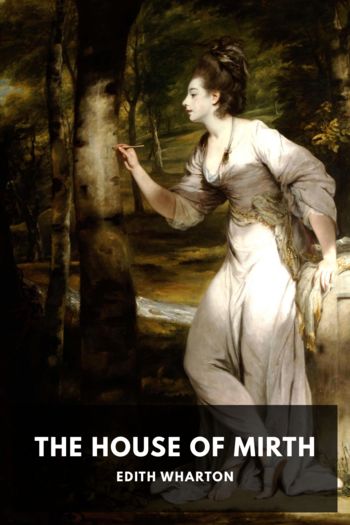The House of Mirth - Edith Wharton (phonics reader .txt) 📗

- Author: Edith Wharton
Book online «The House of Mirth - Edith Wharton (phonics reader .txt) 📗». Author Edith Wharton
They grew to sudden acuteness as she caught sight of George Dorset descending the steps of the Hotel de Paris and making for her across the square. She had meant to drive down to the quay and regain the yacht; but she now had the immediate impression that something more was to happen first.
“Which way are you going? Shall we walk a bit?” he began, putting the second question before the first was answered, and not waiting for a reply to either before he directed her silently toward the comparative seclusion of the lower gardens.
She detected in him at once all the signs of extreme nervous tension. The skin was puffed out under his sunken eyes, and its sallowness had paled to a leaden white against which his irregular eyebrows and long reddish moustache were relieved with a saturnine effect. His appearance, in short, presented an odd mixture of the bedraggled and the ferocious.
He walked beside her in silence, with quick precipitate steps, till they reached the embowered slopes to the east of the Casino; then, pulling up abruptly, he said: “Have you seen Bertha?”
“No—when I left the yacht she was not yet up.”
He received this with a laugh like the whirring sound in a disabled clock. “Not yet up? Had she gone to bed? Do you know at what time she came on board? This morning at seven!” he exclaimed.
“At seven?” Lily started. “What happened—an accident to the train?”
He laughed again. “They missed the train—all the trains—they had to drive back.”
“Well—?” She hesitated, feeling at once how little even this necessity accounted for the fatal lapse of hours.
“Well, they couldn’t get a carriage at once—at that time of night, you know—” the explanatory note made it almost seem as though he were putting the case for his wife—“and when they finally did, it was only a one-horse cab, and the horse was lame!”
“How tiresome! I see,” she affirmed, with the more earnestness because she was so nervously conscious that she did not; and after a pause she added: “I’m so sorry—but ought we to have waited?”
“Waited for the one-horse cab? It would scarcely have carried the four of us, do you think?”
She took this in what seemed the only possible way, with a laugh intended to sink the question itself in his humorous treatment of it. “Well, it would have been difficult; we should have had to walk by turns. But it would have been jolly to see the sunrise.”
“Yes: the sunrise was jolly,” he agreed.
“Was it? You saw it, then?”
“I saw it, yes; from the deck. I waited up for them.”
“Naturally—I suppose you were worried. Why didn’t you call on me to share your vigil?”
He stood still, dragging at his moustache with a lean weak hand. “I don’t think you would have cared for its denouement,” he said with sudden grimness.
Again she was disconcerted by the abrupt change in his tone, and as in one flash she saw the peril of the moment, and the need of keeping her sense of it out of her eyes.
“ ‘Denouement’—isn’t that too big a word for such a small incident? The worst of it, after all, is the fatigue which Bertha has probably slept off by this time.”
She clung to the note bravely, though its futility was now plain to her in the glare of his miserable eyes.
“Don’t—don’t—!” he broke out, with the hurt cry of a child; and while she tried to merge her sympathy, and her resolve to ignore any cause for it, in one ambiguous murmur of deprecation, he dropped down on the bench near which they had paused, and poured out the wretchedness of his soul.
It was a dreadful hour—an hour from which she emerged shrinking and seared, as though her lids had been scorched by its actual glare. It was not that she had never had premonitory glimpses of such an outbreak; but rather because, here and there throughout the three months, the surface of life had shown





Comments (0)